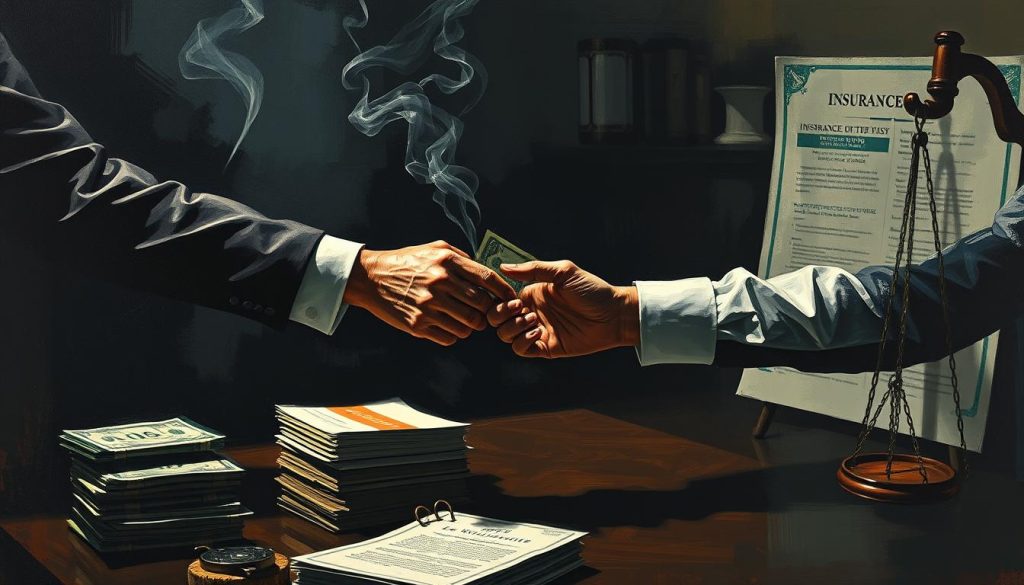Recently, many cases have shown how common attorney kickback schemes are. These schemes involve personal injury lawyers working with healthcare providers to take advantage of accident victims. They also cheat insurance companies. This is not just wrong; it also lets lawyers and healthcare workers make money off others’ pain1.
Kickback schemes in healthcare come in different ways. They can be as simple as cash for patient referrals or more hidden, affecting medical decisions2. These actions harm the healthcare system’s trust and take away resources from where they’re needed most.
Key Takeaways
- Attorney kickback schemes involve collusion between personal injury lawyers and healthcare providers to exploit accident victims and defraud insurance companies.
- These unethical practices violate the trust of clients and allow lawyers and healthcare professionals to profit from the misfortune of others.
- Kickbacks in healthcare can take many forms, including cash payments for patient referrals, and undermine the integrity of the healthcare system.
- Enforcement actions and settlements have resulted in significant financial penalties for companies and individuals involved in kickback schemes.
- Strict laws and regulations, such as the Anti-Kickback Statute and Stark Law, aim to prevent these unethical practices and protect consumers.
- https://criminalinjurylaw.com/settlement-scam-stories-how-lawyers-keep-your-payouts-for-themselves-9/
Decoding Attorney Kickback Schemes
Kickback schemes involving attorneys are a complex web of unethical practices. They exploit both clients and the healthcare system. At the heart of these schemes are attorney kickback schemes, where lawyers get payments or incentives for referring clients to specific healthcare providers or services3. These schemes break client trust and contribute to organized fraud, money laundering, and other illegal activities, raising costs for everyone4.
What Constitutes a Kickback Scheme?
A kickback scheme in the legal and healthcare context involves lawyers getting compensation for directing clients to specific healthcare providers or services4. This is seen as a violation of the federal Anti-Kickback Statute and similar state laws. It creates a financial incentive for lawyers to prioritize their interests over their clients’ needs5.
Legal Implications and Consequences
Being part of an attorney kickback scheme can lead to severe legal consequences. This includes federal felony charges, fines of up to $25,000, and imprisonment for up to five years5. These schemes often also violate the False Claims Act, leading to more civil fines and penalties5. A medical device company paid $18 million to settle kickback allegations, with $15.21 million going to the U.S. Treasury and $2.79 million to states5.
The legal consequences of attorney kickback schemes are severe, with potential financial penalties and criminal charges. These unethical practices harm clients and contribute to patient brokering and insurance fraud, increasing healthcare costs4.
Unethical Practices: Referral Fees and Patient Brokering
Personal injury attorney kickback schemes often involve unethical practices. These include “referral fees” and “patient brokering.” Instead of directly soliciting clients, these attorneys use indirect methods to steer accident victims towards their services6.
This type of patient brokering is seen as highly unethical and illegal. Federal and state laws prohibit it. Patients should be able to choose their own healthcare providers and legal representation without being influenced by improper financial arrangements.
The Stark Law in the United States prohibits physicians from receiving payments for referrals involving specific federal healthcare programs. The Anti-Kickback Statute broadens this restriction to all federal healthcare programs and referral sources6. Some states like California and Florida have laws prohibiting patient brokering by treatment centers6.
Despite these laws, referral fees and patient brokering continue to plague the healthcare and legal industries7. Brokers can earn $500 to $5,000 for referring a patient to a treatment facility. They may even charge upwards of $80,000 for a 25-40 day stay8. This creates a cycle of individuals cycling through treatment facilities, rather than focusing on true recovery7.
Treatment providers like Castle Craig in Scotland and Paracelsus Recovery in Switzerland emphasize ethical values and patient-centered care6. The National Association of Addiction Treatment Providers (NAATP) in the U.S. has a code of ethics that prohibits referral payments. This ensures members follow ethical guidelines6.
The continuation of illegal practices like paying for referrals could lead to a collapse of treatment centers. This was warned by M. David Meagher in California6. Tighter boundaries in legislation and more oversight in treatment centers and sober houses are needed to address this issue7.
The Attorney Kickback Schemes Playbook
Attorney kickback schemes follow a well-known playbook. They target accident victims to make money fraudulently. These schemes involve personal injury lawyers and healthcare providers working together. They aim to make more money by cheating innocent people.
Step 1: Solicit Accident Victims
The scheme starts with a car accident. A tow truck driver or body shop owner suggests a personal injury attorney. Unaware of the illegal referral fee, the victim then becomes the attorney’s client9.
Step 2: Refer to Complicit Healthcare Providers
After the victim signs up, the attorney sends them to a healthcare provider. This provider is part of the illegal deal, like Margate Physicians or Broward Spine Associates. The attorney and healthcare provider scam the victim’s insurance for their own gain9.
| Offense | Penalty |
|---|---|
| Violation of the federal Anti-Kickback Statute (AKS) | Criminal fines up to $100,000 per violation and prison sentences of up to 10 years10 |
| Physician involvement in kickback schemes | Additional fines of up to $50,000 per violation under the Civil Monetary Penalties Law10 |
| Recent high-profile cases | A pharmacy president sentenced to 3 years in prison for a $32 million kickback scheme, and a Georgia chiropractor admitting to a $14.9 million kickback and fraud scheme10 |
These schemes are not just unethical; they also threaten the legal system and protect consumers. Knowing the playbook and its consequences helps people spot and report these scams.
Insurance Fraud and Abuse of PIP Coverage
In Florida, personal injury attorneys and healthcare providers took advantage of the Personal Injury Protection (PIP) insurance system. They did this by sending accident victims to certain healthcare providers. This way, they could make false claims to the victims’ PIP insurance, committing large-scale insurance fraud and PIP coverage abuse11.
Healthcare fraud costs up to $300 billion a year, affecting property/casualty insurance. This includes medical payments for auto accidents or workplace injuries11. Auto insurers also lose at least $29 billion yearly due to premium leakage. This includes unrecognized drivers, underestimated mileage, and false garaging to lower premiums11.
The defendants in Florida found ways to bypass rules against healthcare providers getting payments for referrals11. This let them engage in healthcare fraud conspiracies and use the PIP insurance system for their benefit11.
To fight insurance fraud, efforts have been made. For example, the National Motor Vehicle Title Information System now covers 99% of U.S. vehicles. Also, the National Fraud Prevention Partnership was created to tackle healthcare fraud11.

In 2022, the New York Department of Financial Services Insurance Frauds Bureau (IFB) opened 53 healthcare fraud investigations. These led to 58 arrests12. The IFB got over 30,000 reports of suspected healthcare fraud, with 73% being about no-fault insurance12.
Insurance fraud and PIP coverage abuse are big problems for the industry. They cost the United States over $300 billion a year11. To fight these issues, we need to stay alert, work together, and use effective strategies to keep the insurance system honest.
Federal and State Laws Prohibiting Kickback Schemes
Kickback schemes in healthcare are banned by federal and state laws. The Anti-Kickback Statute13 is stricter than the Stark Law. It covers all medical providers who can arrange or suggest services. Claims that break the Anti-Kickback Statute are seen as false under the False Claims Act13.
The Anti-Kickback Statute
The Anti-Kickback Statute (42 U.S.C. § 1320a-7b(b)) makes kickbacks illegal. It sees kickbacks as a form of bribery for referrals14. Breaking this law is a serious crime, with up to ten years in jail and $100,000 fines14.
The Civil Monetary Penalties Law (CMPL) adds more penalties. You could face up to $50,000 for each kickback. Plus, three times the amount of the kickback and a False Claims Act Penalty of up to $27,894 per bill14.
State Laws Against Kickbacks and Fraud
Many states also have laws against kickbacks and fraud in healthcare13. These laws protect patients and ensure doctors give care without financial bias13.
The Department of Justice has tackled big cases of off-label marketing. They’ve settled for over $1 billion in some cases15. Whistleblowers help expose these violations, helping to stop fraud and abuse13.
“The Anti-Kickback Statute was first enacted in 1972 as amendments to the Social Security Act and has since been amended multiple times.”14
The Anti-Kickback Statute bans kickbacks to get healthcare business. It applies to doctors, patients, and others involved in referrals14. Anything of value, like discounts, is considered a felony14.
Referrals under this law include more than just recommendations. It covers many health services14.
The Stark Law (42 U.S.C. § 1395nn) only deals with doctor relationships. It bans many financial ties without needing proof of intent13. There are “safe harbors” for certain arrangements under both laws13. Ignorance of the Anti-Kickback Statute is not a defense under the False Claims Act13.
Violations include kickbacks to doctors, low rent, and high prices for practices13. The home healthcare market is growing fast, expected to reach $153.19 billion by 202915. In April 2022, the Department of Justice sued True Health Diagnostics LLC and Boston Heart Diagnostics Corporation for kickback schemes15.
High-Profile Attorney Kickback Schemes Cases
Attorney kickback schemes have caused big problems in the legal and healthcare fields. Many cases have shown how widespread these wrongdoings are16. For example, Milberg Weiss, a well-known law firm, made about $250 million over 20 years from kickbacks16.
They paid $11.3 million in bribes to people who became plaintiffs in lawsuits against big companies like AT&T and Microsoft16. Seven people, including three former Milberg Weiss partners, pleaded guilty. William Lerarch got two years in federal prison for his role16.
In Los Angeles, a lawyer named Paul O. Paradis was sentenced to 33 months in prison for taking a $2.2 million kickback17. He bribed a LADWP general manager for a $30 million contract. The $67 million settlement in the Jones v. City of Los Angeles case included $19 million for lawyers, with $2,175,000 secretly going to Paradis17.
These cases show how common attorney kickback schemes are. They often involve patient brokering, fraud, and money laundering1617. Those caught face big fines, restitution, and prison, and can lose their law licenses1617.

These cases stress the need for strict laws and enforcement to stop these unethical practices1617. The legal field must also maintain high ethical standards1617.
attorney kickback schemes: A Threat to Legal Ethics
The recent discovery of attorney kickback schemes in Florida has highlighted a serious issue. It shows a clear threat to legal ethics and the trust clients have in their lawyers18. These schemes, like “ambulance chasing” and deals with healthcare providers, show a big disregard for lawyers’ duty to their clients18.
Instead of focusing on their ethical duties, these lawyers are more concerned with making money. This has damaged the reputation of the legal profession18. Such kickback schemes hurt public trust in the legal system and show we need to keep professional standards high18.
“Financial conflicts of interest undermine trust in a provider’s judgment. Despite five decades of cautionary tales about corrupt practices, kickbacks remain pervasive in the industry.”
The Anti-Kickback Statute has been around since the 1970s. It has been fighting payola in U.S. healthcare for over 50 years18. But, despite these efforts, the Department of Justice and whistleblowers keep finding kickback cases in healthcare18.
The U.S. healthcare inspector general says money’s influence is still a big worry18. While some progress has been made, experts say kickbacks are getting sneakier. This makes them harder to spot and punish18.
The danger of attorney kickback schemes to legal ethics is obvious. By doing these wrong things, lawyers are breaking their clients’ trust and harming the legal profession’s base. It’s important for the legal world to act fast to fix this and bring back trust in the legal system.
Conclusion
In Florida, attorney kickback schemes have shown the deep legal and ethical problems they cause. These schemes involve paying kickbacks for referrals and using insurance unfairly. They break federal and state laws and harm the trust between clients and lawyers19.
Those caught in these schemes face harsh penalties. This includes criminal charges, fines, and losing professional licenses. It also damages the legal industry’s reputation20.
It’s vital for lawyers and patients to know about these dangers. They should push for the highest ethical standards in law and healthcare1920. By doing this, the legal field can regain public trust. Clients will get the quality help they need, without financial bias.
The battle against kickback schemes and healthcare fraud must keep going. Lawmakers, regulators, and lawyers need to stay alert and active1920. Together, we can clean up these unethical practices. This will protect the legal profession’s honor and keep justice the main goal for legal help.
FAQ
What is an attorney kickback scheme?
An attorney kickback scheme is when lawyers get money from others for sending clients their way. This is against the law and is seen as unethical.
What are the legal implications of attorney kickback schemes?
Breaking the law, these schemes can lead to big trouble. Lawyers might face jail time, huge fines, and lose their licenses.
How do attorneys engage in patient brokering and referral fee arrangements?
Some lawyers use shady tactics like “ambulance chasing.” They team up with healthcare providers to get more clients. This is done by getting paid by third parties for referrals.
How do attorney kickback schemes involve insurance fraud and PIP coverage abuse?
Lawyers and healthcare providers scam the system by making false claims. They bill for services that weren’t really needed. This way, they make money off their clients and the insurance companies.
What federal and state laws prohibit attorney kickback schemes?
Laws like the Anti-Kickback Statute and state laws ban kickbacks in healthcare. They aim to keep services honest and protect patients.
Can you provide examples of high-profile attorney kickback scheme cases?
Yes, in South Florida, a group of lawyers were caught in a fraud scheme. They worked with healthcare providers to scam insurance companies.
How do attorney kickback schemes threaten legal ethics and the legal profession?
These schemes damage trust between lawyers and clients. Lawyers focus on making money instead of helping their clients. This hurts the reputation of the legal field.

